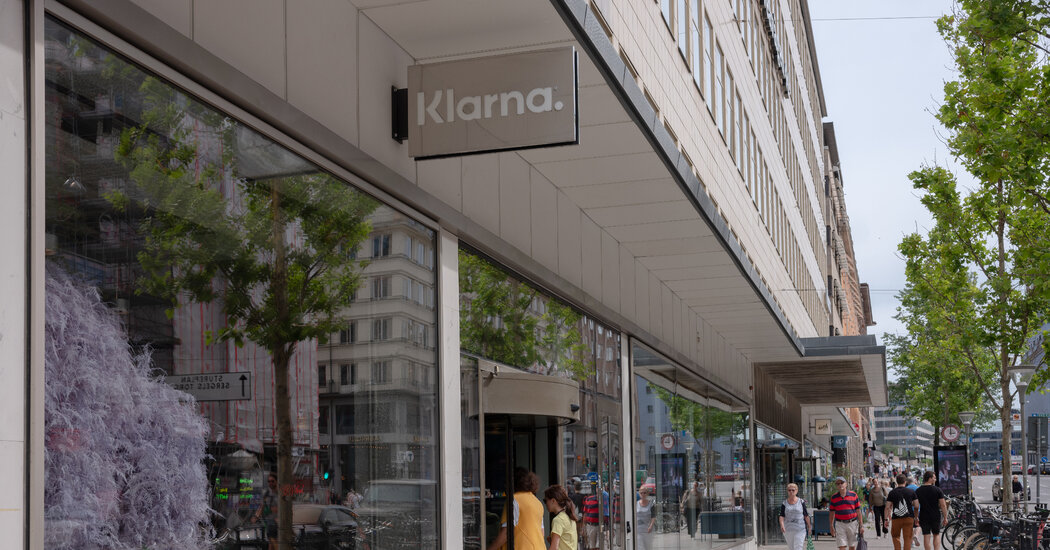DoorDash customers can now take out a loan for a $40 order of burritos or a $50 pizza delivery.
The financial tech company Klarna and the delivery company DoorDash said that they had partnered to provide a “buy now, pay later” loan option for orders.
The arrangement, announced on Thursday, lets customers defer the cost of DoorDash orders placed online or through its app by paying it in four interest-free payments, or at a later date, according to Klarna.
Chuck Bell, advocacy program director at Consumer Reports, said “buy now, pay later” loans can be manageable for many people. He advised that these loans should be used selectively, that customers should be aware of when their payments are due and ensure that they have the money to pay the loans back.
“If you don’t pay the bill on time and you start getting multiple late fees, it could end up being a very expensive chile relleno or pad Thai,” Mr. Bell said.
Research has shown that “buy now, pay later” loans are more often used by people who are already in debt.
Mr. Bell said that these loans could cause problems for people who have many loans and who use them to finance a recurring expense, such as food.
“Are you pushing off some of that expense into future months, knowing that you’re going to have to buy food next month and are you going to finance that as well?” he said.
DoorDash is best known for offering food deliveries from restaurants, but retail items like electronics, makeup and medicine are also available.
Anand Subbarayan, head of money products at DoorDash, said in a statement that flexible payment options were “essential” for the company’s customers as it expands the types of products it delivers.
After the announcement, concerns spread online that people would use payment deferral for food delivery purchases that can be $10 or $20.
In response, Klarna said in a blog post that the option to pay in four installments would be available only for purchases over $35. The company also said that it was better for a person to pay $200 for groceries in interest-free installments than to pay for them with a credit card, which could result in fees and interest.
“Because there is no interest, our business model relies on customers repaying us on time, unlike credit cards,” Klarna said. “So we conduct a thorough eligibility check before approving a purchase, and if a customer misses a payment, we restrict their use of our services — something credit card companies wouldn’t do, as they profit from late and revolving payments.”
Klarna, which is based in Stockholm, is preparing for its initial public offering. It already works with other food-delivery companies, including Instacart and Uber Eats.
“Buy now, pay later” loans offered by companies like Klarna, PayPal and Affirm have been under scrutiny as they grow in popularity.
In 2022, 21.2 percent of consumers financed at least one purchase with these loans, according to a January 2025 report by the Consumer Financial Protection Bureau. That is up from 17.6 percent in 2021.
Compared with people of the same age and credit score category who did not use these loans, people with a “buy now, pay later” loan were more likely to have higher balances on other types of debt, such as personal loans, student loans and credit card debt, the report said.
About 20 percent of “buy now, pay later” borrowers in 2022 were classified as heavy users and took out at least one of those loans per month, the report said. About 63 percent of borrowers had multiple, simultaneous loans at some point in the year, the report said.
The C.F.P.B., a watchdog that has been targeted for closure by the Trump administration, has been scrutinizing these types of loans.
Last year, the bureau ruled that lenders had to offer similar protections as credit cards provided, such as by allowing customers to dispute charges.
The bureau’s report from January said people defaulted on “buy now, pay later” loans at a lower rate than credit card payments, likely because those lenders require customers to set up automatic repayments.
Between 2019 and 2022, borrowers defaulted on 2 percent of those loans and defaulted on 10 percent of the credit cards they held in the same period.



